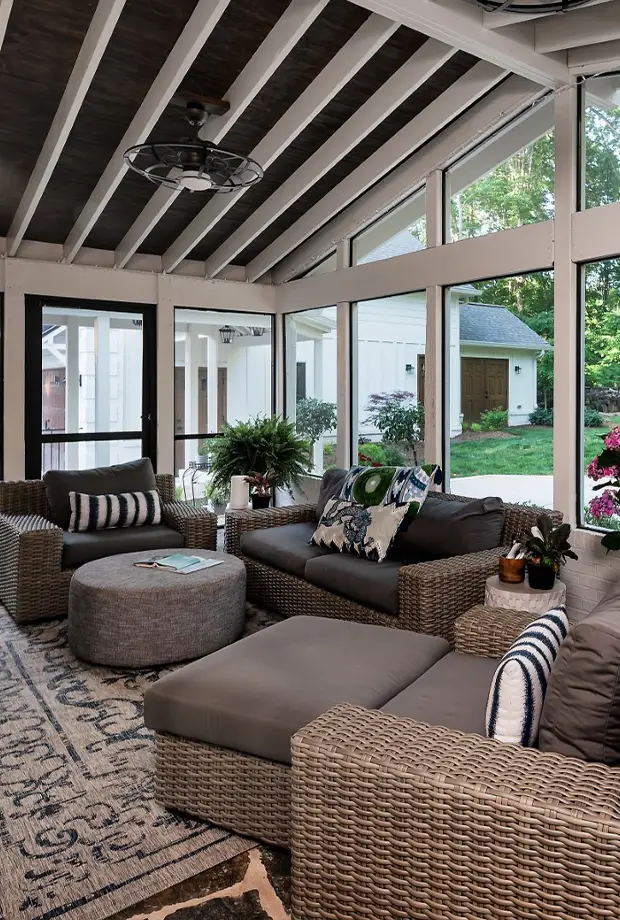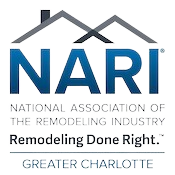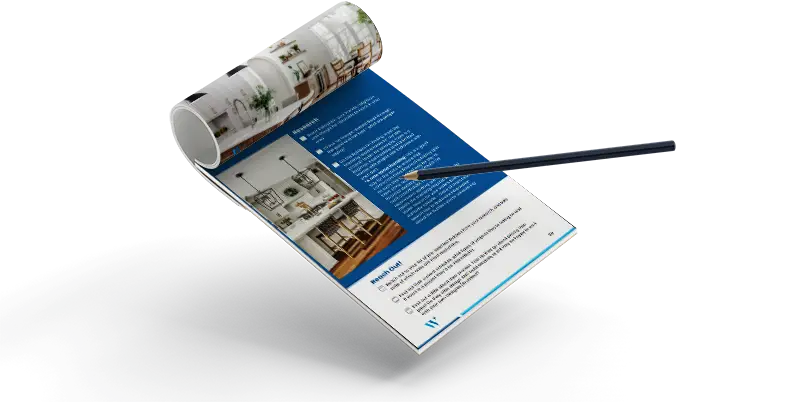Home Renovations in Charlotte, NC: Your Complete Guide to Transforming Your Space
In the vibrant real estate landscape of Charlotte, North Carolina, home renovations have become more than just maintenance projects—they’re transformative investments that enhance both lifestyle and property value. As Charlotte continues to grow as a premier destination for luxury living, homeowners are increasingly seeking sophisticated renovation solutions that blend functionality, aesthetics, and long-term value.
Watershed Builders has established itself as Charlotte’s premier luxury home renovation contractor, bringing unparalleled craftsmanship and attention to detail to every project. With decades of combined experience transforming Charlotte’s most prestigious homes, our team understands the unique challenges and opportunities presented by the Queen City’s diverse architectural styles and neighborhood characteristics.
This comprehensive guide will walk you through everything you need to know about home renovations in Charlotte for 2025 and beyond. From the latest design trends captivating the city’s most discerning homeowners to detailed cost breakdowns for kitchen and bathroom renovations, we’ve compiled essential information to help you make informed decisions about your renovation journey. You’ll discover neighborhood-specific considerations, navigate the sometimes complex world of permits and regulations, and learn how to select the right contractor for your specific needs.
Charlotte’s renovation landscape is uniquely positioned at the intersection of Southern traditional charm and contemporary luxury. The city’s robust economic growth continues to fuel demand for high-end renovations that respect architectural heritage while embracing modern innovations. Whether you’re renovating a historic bungalow in Dilworth, updating a mid-century ranch in Myers Park, or transforming a contemporary home in Montibello, this guide provides the insights you need to approach your project with confidence.
As we explore the exciting world of home renovations in Charlotte, you’ll gain valuable knowledge about current trends, practical considerations, and the exceptional results that can be achieved when working with experienced professionals who understand the local market. Let’s begin this journey to transform your Charlotte home into the space you’ve always envisioned.
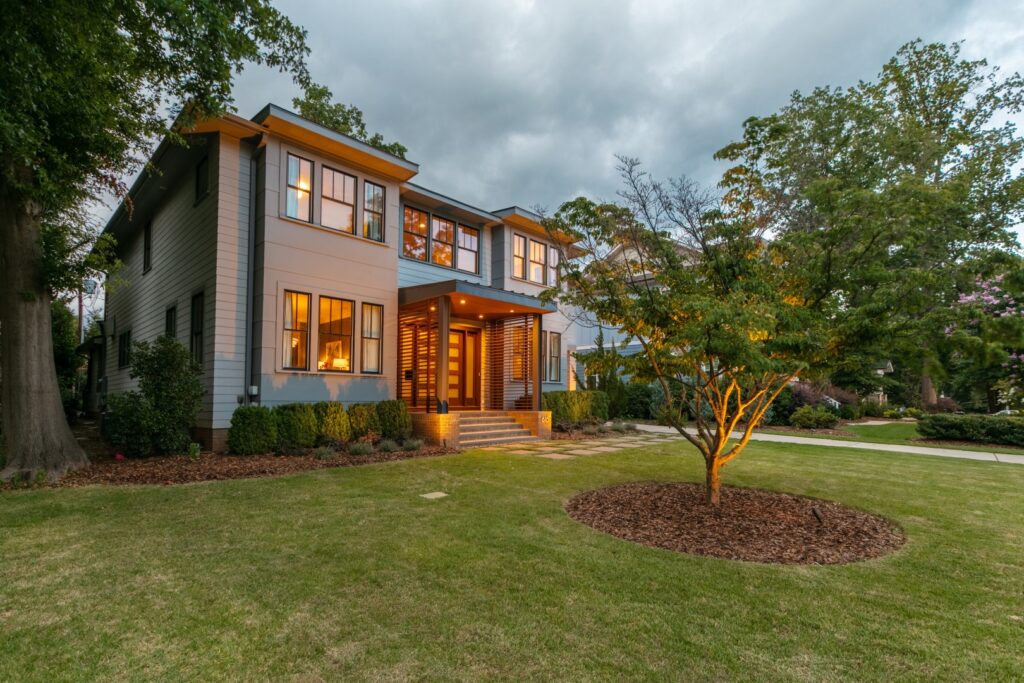
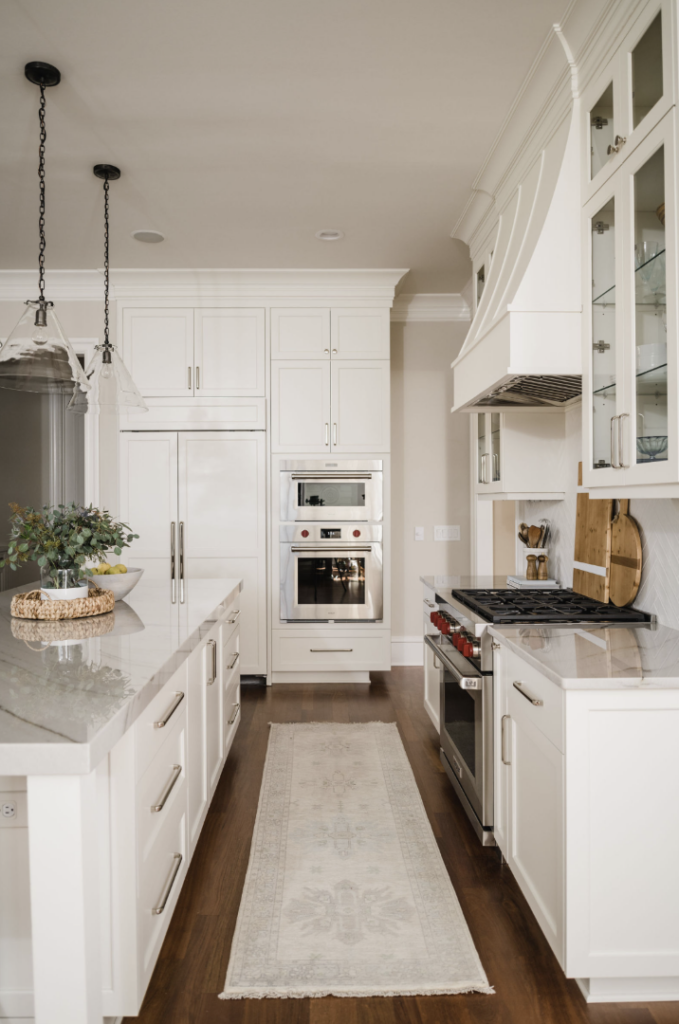
2025 Home Renovation Trends in Charlotte
Charlotte’s home renovation landscape is evolving rapidly in 2025, with homeowners increasingly seeking designs that reflect personal style while incorporating functionality and sustainability. As one of Charlotte’s premier renovation contractors, Watershed Builders stays at the forefront of these emerging trends, helping clients transform their homes with designs that are both timeless and contemporary.
Bold, Personalized Interiors
The era of neutral, minimalist designs is giving way to more expressive, personality-driven interiors in Charlotte homes. Homeowners are embracing warm, earthy tones like olive green, rust, and deep blue that create inviting, distinctive spaces. This shift reflects a desire for homes that tell a personal story rather than following one-size-fits-all design templates.
Custom cabinetry has become a focal point in 2025 renovations, with clients requesting unique storage solutions that combine functionality with artistic expression. Statement lighting fixtures serve as architectural jewelry in renovated spaces, with oversized pendants, artistic chandeliers, and integrated LED systems transforming rooms beyond mere illumination.
Unique tile patterns and custom millwork are also gaining popularity, allowing homeowners to incorporate distinctive elements that won’t be found in neighboring homes. These personalized touches create spaces that feel curated and meaningful rather than mass-produced.
Vintage & Nostalgic Aesthetics
Charlotte homeowners are increasingly drawn to renovation designs that honor the past while embracing modern convenience. This “vintage revival” trend blends classic architectural elements like stone fireplaces, intricate woodwork, and antique finishes with contemporary amenities and technology.
The “grandmacore” aesthetic has made a surprising comeback in 2025, featuring floral patterns, cozy textures, and vintage-inspired furniture that creates spaces feeling both stylish and nostalgic. This trend particularly resonates in Charlotte’s historic neighborhoods, where homeowners seek to preserve character while updating functionality.
Renovation projects now frequently incorporate architectural salvage and repurposed materials, adding authentic character while supporting sustainability. These elements connect homes to Charlotte’s rich architectural heritage while reducing environmental impact.
Natural Materials & Earthy Finishes
Organic, sustainable materials continue to dominate Charlotte’s renovation scene in 2025. Dark wood cabinetry, stone countertops, and textured walls are becoming standard features in kitchen and bathroom remodels, replacing the stark white aesthetics that dominated previous years.
Materials like walnut, oak, and terracotta are being used to add warmth and timeless appeal to homes. These natural elements create spaces that feel grounded and connected to the environment, a welcome contrast to the digital world that dominates much of modern life.
Textural diversity has become a key consideration in renovation design, with homeowners mixing smooth surfaces with rough-hewn elements to create visual and tactile interest. This approach adds depth and sophistication to interiors while creating a sensory-rich environment.
Functional, Defined Spaces
While open-concept layouts remain popular, many Charlotte homeowners are now redefining their spaces to create dedicated areas for specific activities. This shift has been accelerated by changing work patterns and a greater emphasis on home-based activities.
Dedicated home offices have become essential in 2025 renovations, with homeowners investing in thoughtfully designed workspaces that support productivity while complementing the home’s overall aesthetic. These spaces often feature built-in storage, sound insulation, and carefully planned lighting to enhance focus and comfort.
Reading nooks, meditation corners, and hobby spaces are increasingly incorporated into renovation plans, creating purposeful retreats within the home. These specialized areas reflect a growing desire for spaces that support mental wellbeing and personal interests.
Multi-purpose rooms that can adapt to changing needs continue to be valuable, especially in homes where space is at a premium. Innovative storage solutions and flexible furniture arrangements allow these spaces to transition seamlessly between different functions.
Expanding Outdoor Living Spaces
Charlotte’s mild climate makes outdoor living spaces a natural extension of the home, and 2025 has seen unprecedented investment in these areas. Luxury outdoor kitchens with built-in grills, pizza ovens, and refrigeration have become standard features in high-end renovations, allowing homeowners to entertain and dine alfresco year-round.
Covered patios with stylish seating areas and fireplaces create comfortable outdoor rooms that can be enjoyed regardless of weather conditions. These spaces often feature weather-resistant materials that maintain their beauty while withstanding Charlotte’s seasonal changes.
Smart outdoor lighting systems enhance both ambiance and security, with programmable LED fixtures that can be controlled remotely. These sophisticated systems extend the usability of outdoor spaces into the evening hours while highlighting architectural features and landscaping.
Sustainable & Energy-Efficient Home Upgrades
As energy costs continue to rise, Charlotte homeowners are prioritizing sustainability in their renovation projects. Smart thermostats that optimize heating and cooling based on usage patterns have become standard installations, reducing energy consumption while maintaining comfort.
Solar panel installations are increasingly incorporated into renovation plans, with homeowners taking advantage of improved technology and incentive programs to reduce long-term energy costs. These systems are now designed to integrate seamlessly with existing architecture, preserving aesthetic appeal while providing significant energy benefits.
LED lighting and low-flow fixtures are now considered baseline features in quality renovations, reducing resource consumption without compromising performance. These relatively simple upgrades provide immediate efficiency improvements while supporting long-term sustainability goals.
Smart Home Integration
The demand for integrated smart home technology continues to grow in Charlotte’s renovation market. Voice-controlled lighting and thermostats offer convenience and efficiency, allowing homeowners to adjust their environment with simple commands or pre-programmed routines.
Automated security systems with mobile access provide peace of mind, with features like doorbell cameras, motion sensors, and smart locks that can be monitored and controlled remotely. These systems are now being integrated during the renovation process rather than added afterward, ensuring seamless installation and operation.
AI-powered kitchen appliances represent the cutting edge of home technology in 2025, with refrigerators that track inventory, ovens that recognize food types and adjust cooking accordingly, and dishwashers that optimize water usage based on load size and soil level. These sophisticated appliances are increasingly requested in high-end kitchen renovations, combining convenience with resource efficiency.
As Charlotte continues to evolve as a hub for technology and innovation, smart home features are becoming expected elements in quality renovations rather than luxury add-ons. This shift reflects a broader trend toward homes that actively support and enhance daily living through thoughtful technology integration.
Get a FREE Custom Quote in MinutesKitchen Renovations in Charlotte
The kitchen remains the heart of the home, and in Charlotte’s luxury real estate market, a well-designed kitchen renovation can significantly enhance both daily living and property value. As we move through 2025, kitchen renovations continue to evolve, blending functionality with sophisticated design elements that reflect the homeowner’s personal style while incorporating the latest innovations.
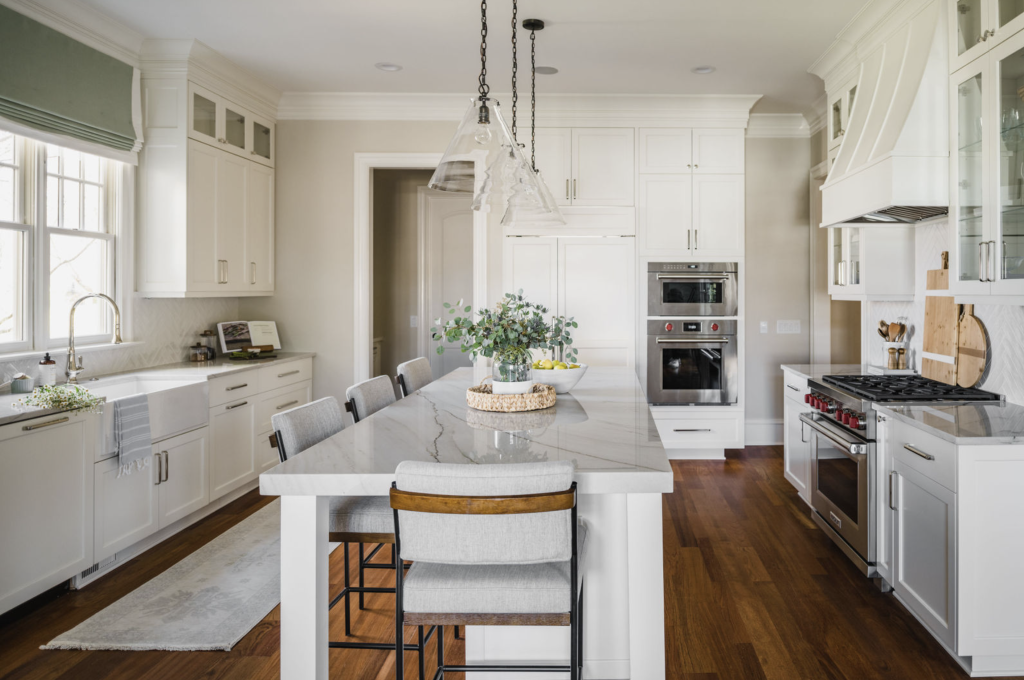
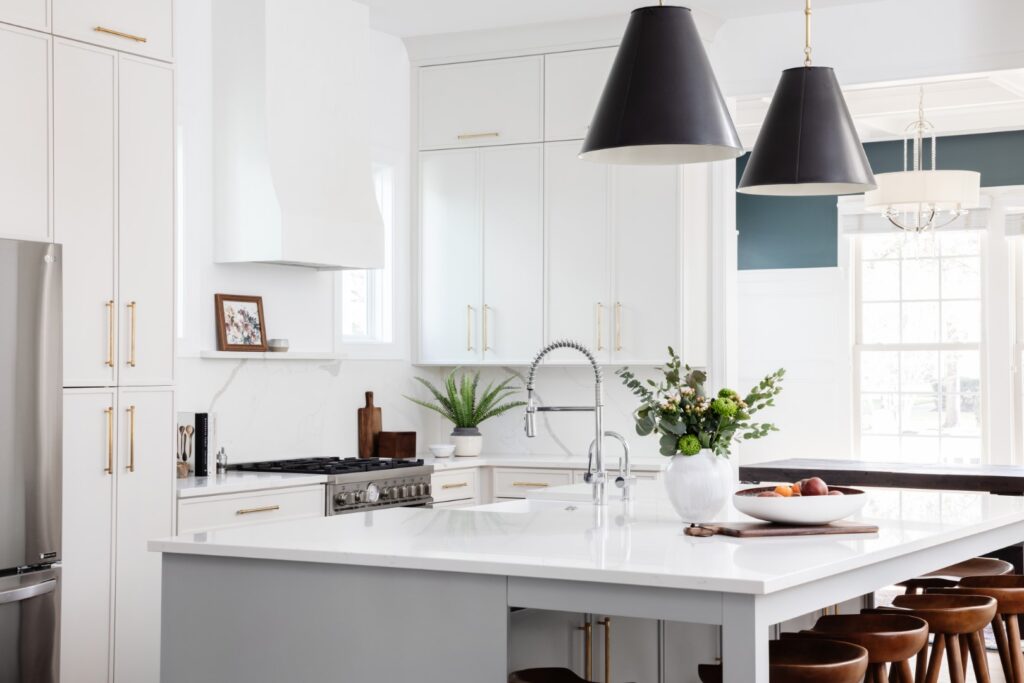
Current Kitchen Design Trends for 2025
Bold Color Schemes Replacing Neutrals
While neutral kitchens have dominated Charlotte homes for years, 2025 has ushered in a dramatic shift toward bolder color palettes. Deep blues, forest greens, and rich burgundies are appearing on cabinetry, islands, and accent walls, creating kitchens with distinctive personality and visual impact. These stronger hues are often balanced with neutral countertops and backsplashes to maintain a sense of harmony and prevent overwhelming the space.
Many Charlotte homeowners are embracing two-tone kitchen designs, pairing darker base cabinets with lighter upper cabinets or incorporating a statement island in a contrasting color. This approach adds visual interest while maintaining a cohesive overall design. Colorful range hoods and appliances in custom finishes are also gaining popularity as focal points in otherwise understated kitchens.
Custom Cabinetry and Statement Lighting
Custom cabinetry has become a defining feature of luxury kitchen renovations in Charlotte. Homeowners are moving beyond standard cabinet configurations to incorporate specialized storage solutions like appliance garages, custom spice drawers, and dedicated beverage stations. These personalized elements enhance functionality while creating a kitchen that perfectly suits the homeowner’s specific needs and habits.
Statement lighting fixtures serve as the jewelry of renovated kitchens, with oversized pendants, artistic chandeliers, and integrated LED systems transforming the space. Mixed metals and unique materials like hand-blown glass, hammered copper, and matte black finishes add character and sophistication. Thoughtfully designed lighting plans now include task lighting, ambient lighting, and accent lighting to create flexible environments that transition seamlessly from food preparation to entertaining.
Natural Materials and Sustainable Options
Charlotte homeowners are increasingly drawn to natural materials that bring warmth and texture to kitchen spaces. Quartzite and marble countertops with dramatic veining have replaced more uniform surfaces, becoming artistic elements in their own right. Wood accents in ceiling beams, range hoods, and floating shelves add organic warmth that balances sleeker elements like stainless steel appliances.
Sustainability has become a priority in kitchen renovations, with homeowners seeking eco-friendly materials and energy-efficient appliances. Reclaimed wood, recycled glass countertops, and low-VOC finishes are increasingly requested, reflecting a growing environmental consciousness. Water-saving fixtures and energy-efficient appliances are now considered standard features rather than upgrades in quality renovations.
Kitchen Renovation Costs in Charlotte
Semi-custom Kitchen Renovations ($125k+ Range)
Semi-custom kitchen renovations in Charlotte typically start around $125,000 and include replacing all materials throughout the kitchen while maintaining the existing footprint. These projects feature high-quality cabinetry, countertops, and backsplash materials, but without significant structural changes or layout modifications.
A semi-custom renovation generally includes:
- Design services, project management, demolition, installation, permitting, and inspection fees
- All new cabinetry, countertops, and backsplash tile
- Cabinet hardware and accessories
- Electrical, mechanical, and plumbing updates
- Trim carpentry
- Flooring updates (if required)
- Structural updates (if required)
- Drywall and paint
These renovations offer significant improvements in both functionality and aesthetics while working within the existing kitchen framework. They’re ideal for homeowners who are satisfied with their kitchen’s basic layout but want updated finishes and improved functionality.
Custom Luxury Kitchen Renovations ($200k+ Range)
Custom luxury kitchen renovations in Charlotte start around $200,000 and involve a complete redesign of the space with premium materials and often significant structural modifications. These high-end renovations frequently include removing walls, relocating plumbing and electrical systems, and creating entirely new layouts optimized for both cooking and entertaining.
A custom luxury renovation typically includes:
- A total re-design with all new materials throughout
- Wall, flooring, window, and door modifications as needed
- Updates and relocations to all plumbing, electrical, and mechanical connections
- Premium appliance packages (though appliances themselves are typically purchased separately)
- Custom cabinetry with specialized storage solutions
- Luxury countertop materials like quartzite, marble, or exotic granites
- Designer lighting packages
- Smart home technology integration
- Architectural details like coffered ceilings or custom range hoods
These comprehensive renovations transform not just the appearance but the entire functionality of the kitchen, creating showcase spaces that serve as the centerpiece of the home.
Factors Affecting Kitchen Renovation Costs
Several key factors influence the final cost of a kitchen renovation in Charlotte:
- Size and scope: Larger kitchens require more materials and labor, directly impacting costs. Similarly, projects involving structural changes like removing walls or relocating plumbing will be significantly more expensive than surface-level updates.
- Material selections: The quality and type of materials chosen dramatically affect the budget. For example, custom cabinetry costs substantially more than semi-custom options, and natural stone countertops command premium prices compared to manufactured alternatives.
- Appliance packages: While appliances are typically purchased separately from the renovation budget, accommodating professional-grade appliances often requires additional structural support, specialized ventilation, and custom cabinetry modifications.
- Neighborhood standards: Renovation budgets should align with neighborhood property values to ensure appropriate return on investment. A $250,000 kitchen renovation might be appropriate in Myers Park but could represent overcapitalization in other Charlotte neighborhoods.
- Supply chain considerations: Material availability and lead times can impact both costs and timelines. Custom items often require longer lead times, which should be factored into the overall project schedule.
Kitchen Renovation ROI and Value-Add
Expected Return on Investment
Kitchen renovations consistently rank among the home improvements with the highest return on investment in Charlotte. According to recent market analysis, homeowners can expect to recoup approximately 60-75% of their kitchen renovation costs in increased home value, with upscale renovations in premium neighborhoods sometimes yielding even higher returns.
The ROI varies significantly based on several factors:
- Neighborhood property values and buyer expectations
- Quality of materials and craftsmanship
- Alignment with current design trends
- Overall functionality and appeal
- Energy efficiency and sustainable features
Minor to mid-range kitchen renovations (those in the $125,000 range) often yield the highest percentage return, while very high-end custom renovations may offer lower percentage returns but can be essential for selling luxury properties in Charlotte’s most prestigious neighborhoods.
Most Valuable Kitchen Upgrades
Certain kitchen improvements consistently deliver stronger returns than others in Charlotte’s luxury market:
- Quality cabinetry: Well-constructed, thoughtfully designed cabinetry with soft-close features and specialized storage solutions adds significant value and appeal.
- Natural stone countertops: Premium countertop materials like quartzite, marble, and high-end granite remain highly desirable and worth the investment.
- Professional-grade appliances: While expensive, high-quality appliances signal to buyers that no expense was spared in creating a premium kitchen.
- Efficient layouts: Improvements that enhance workflow and functionality, like kitchen islands with prep sinks or thoughtfully designed cooking zones, add substantial value.
- Lighting upgrades: Comprehensive lighting plans that include ambient, task, and accent lighting create versatile, inviting spaces that impress potential buyers.
Features That Appeal to Charlotte Luxury Home Buyers
Charlotte’s luxury home market has specific preferences that should be considered when planning a kitchen renovation:
- Entertainment-focused designs: Open layouts that connect to dining and living areas facilitate the indoor-outdoor lifestyle that Charlotte’s climate supports.
- Butler’s pantries or sculleries: Secondary prep and storage spaces that keep mess contained while the main kitchen remains presentable for guests.
- Smart home integration: Automated lighting, temperature controls, and appliances that can be controlled remotely.
- Sustainable elements: Energy-efficient appliances, water-saving fixtures, and eco-friendly materials appeal to environmentally conscious luxury buyers.
- Outdoor kitchen connections: Designs that create seamless flow between indoor and outdoor cooking and dining spaces, maximizing Charlotte’s favorable climate.
By focusing on these high-value improvements, Charlotte homeowners can ensure their kitchen renovations not only enhance daily living but also represent sound investments in their property’s long-term value.
Get a FREE Custom Quote in MinutesBathroom Renovations in Charlotte
Bathroom renovations represent one of the most significant investments homeowners can make in their Charlotte properties. Beyond enhancing daily comfort and convenience, a thoughtfully designed bathroom renovation can substantially increase home value while creating a personal sanctuary that supports wellbeing. As we navigate 2025, Charlotte’s bathroom renovation trends reflect a sophisticated blend of luxury, technology, and practical functionality.
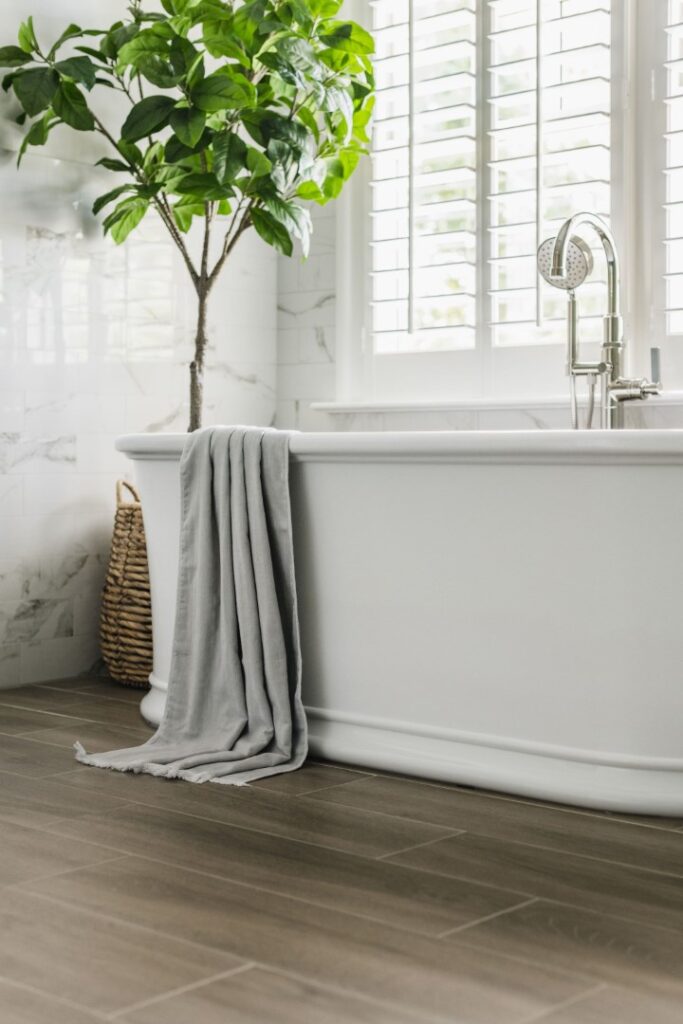
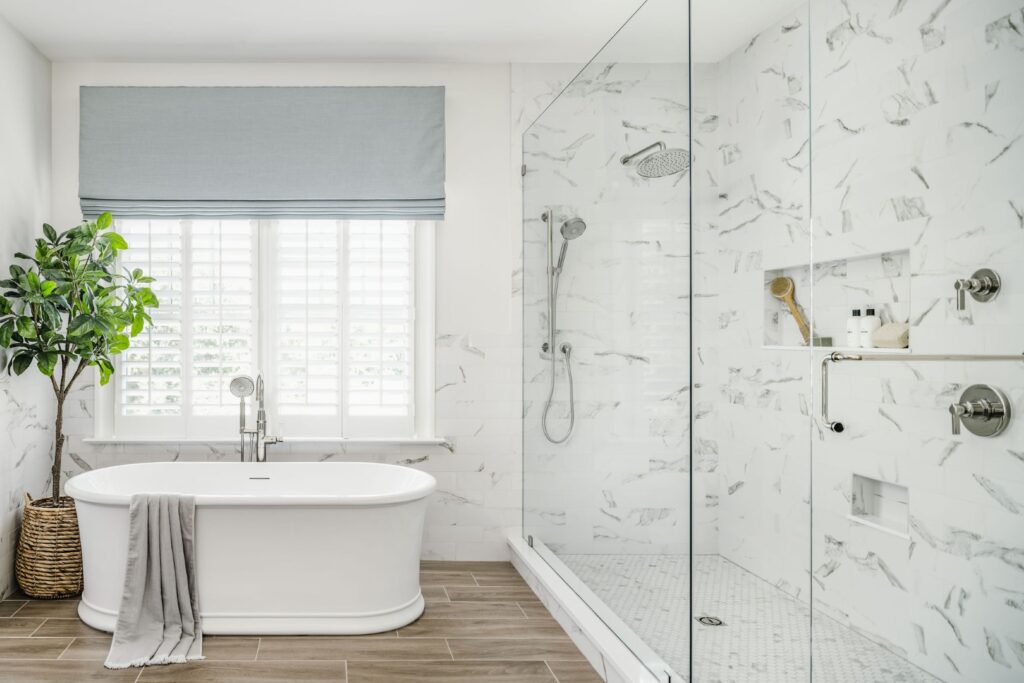
Current Bathroom Design Trends for 2025
Spa-like Features and Wellness Integration
The concept of the bathroom as a wellness retreat has gained tremendous momentum in Charlotte’s luxury homes. Homeowners are increasingly incorporating spa-inspired features that transform utilitarian spaces into personal sanctuaries. Freestanding soaking tubs have become centerpiece elements, often positioned near windows to create a connection with nature while bathing.
Steam showers with aromatherapy integration offer therapeutic benefits beyond basic cleansing, with customizable settings for temperature, steam intensity, and essential oil diffusion. These advanced systems provide resort-quality experiences within the privacy of home, supporting both physical and mental wellbeing.
Heated flooring has transitioned from luxury option to expected feature in upscale bathroom renovations, providing year-round comfort and eliminating the shock of cold tiles on winter mornings. Similarly, towel warmers, once considered extravagant, are now standard inclusions in premium bathroom designs.
Natural Materials and Textured Elements
Charlotte homeowners are embracing natural materials that bring organic warmth and texture to bathroom spaces. Large-format stone tiles with dramatic veining create striking shower surrounds and feature walls, while wood-look porcelain provides the aesthetic appeal of natural timber with superior moisture resistance.
Textural diversity has become a key consideration in bathroom design, with homeowners mixing smooth surfaces with more tactile elements like fluted glass, ribbed wood paneling, and three-dimensional tile. These varied textures add visual interest and sensory richness to spaces that might otherwise feel clinical.
Matte black fixtures continue to gain popularity as alternatives to traditional chrome, offering sophisticated contrast against lighter surfaces. Mixed metals are also trending, with homeowners confidently combining brass, nickel, and bronze elements within cohesive design schemes.
Smart Technology Integration
Technology integration has revolutionized bathroom functionality in Charlotte’s luxury renovations. Smart mirrors with integrated lighting, defoggers, and touch-screen capabilities serve as command centers, offering weather updates, news feeds, and even video conferencing capabilities for efficient morning routines.
Digital shower systems allow precise temperature and flow control through smartphone apps or voice commands, with programmable presets for different users. These systems optimize water usage while providing customized experiences for each family member.
Intelligent toilets with bidet functions, automatic lids, seat warming, and self-cleaning capabilities represent the cutting edge of bathroom technology in 2025. While initially met with hesitation, these advanced fixtures have gained significant traction in Charlotte’s high-end renovations for their superior hygiene and comfort benefits.
Bathroom Renovation Costs in Charlotte
Primary Bathroom Renovations
Primary bathroom renovations in Charlotte typically fall into two distinct categories based on scope and material selections:
Semi-custom Primary Bathrooms ($75k+ Range)
Semi-custom primary bathroom renovations start around $100,000 and include comprehensive updates while maintaining the existing bathroom footprint. These projects feature high-quality materials and fixtures but without significant structural modifications.
A semi-custom primary bathroom renovation typically includes:
- Design services, project management, demolition, installation, permitting, and inspection fees
- All new tile throughout
- New vanity cabinetry and countertops
- Glass shower enclosure (if required)
- All new bath accessories
- Electrical, mechanical, and plumbing updates
- Trim carpentry
- Structural updates (if required)
- Drywall and paint
These renovations offer significant improvements in both functionality and aesthetics while working within the existing bathroom framework. They’re ideal for homeowners who are satisfied with their bathroom’s basic layout but want updated finishes and improved functionality.
Custom Luxury Primary Bathrooms ($100k+ Range)
Custom luxury primary bathroom renovations start around $160,000 and involve a complete redesign with premium materials and often significant structural modifications. These high-end renovations frequently include expanding the bathroom’s footprint, relocating plumbing fixtures, and creating entirely new layouts optimized for both function and relaxation.
A custom luxury primary bathroom renovation typically includes:
- A total redesign with all new materials throughout
- Potential expansion into adjacent spaces
- Relocation of plumbing fixtures and walls as needed
- Premium fixture packages including freestanding tubs and custom shower systems
- Heated flooring systems
- Custom vanities with specialized storage solutions
- Luxury countertop materials like quartzite, marble, or exotic granites
- Designer lighting packages
- Smart home technology integration
- Architectural details like coffered ceilings or custom niches
Many factors contribute to the price point of a primary bathroom renovation, including:
- How large is your space? Tile is often the biggest budget driver in a bathroom remodel, so the larger the space, the greater the tile budget.
- Do you need a separate tub, or will just a shower suffice?
- Do you require any aging-in-place compliances (wider doorway openings, zero-threshold shower entry, shower benches/grab bars)?
- Are you wanting any personalized elements in the space (heated floors, smart toilet, steam shower)?
- How much vanity cabinetry will be needed, and are you in need of any custom storage solutions?
- Tile material (natural stone vs. porcelain/ceramic), tile size, and layout will all impact your bathroom budget.
Guest Bathroom Renovations
Guest bathrooms are typically smaller than primary bathrooms and therefore generally less expensive to renovate, though they still represent significant investments in home improvement.
Semi-custom Guest Bathrooms ($55k+ Range)
Semi-custom guest bathroom renovations start around $55,000 in Charlotte and include comprehensive updates while maintaining the existing bathroom footprint. These projects feature quality materials and fixtures appropriate for spaces that receive intermittent use.
Custom Luxury Guest Bathrooms ($75k+ Range)
Custom luxury guest bathroom renovations start around $75,000 and involve a complete redesign with premium materials. While guest bathrooms are typically smaller than primary bathrooms, they often have fewer options to outfit the space due to size constraints.
Several factors drive the cost of a guest bathroom renovation:
- Are you wanting a tub/shower combination, or just a walk-in shower?
- Do you have room for a single or double vanity?
- Do you need any specific storage solutions (linen tower, updated closet shelving, a recessed medicine cabinet)?
- Are you wanting any personalized elements in the space (heated floors, smart toilet, steam shower)?
Bathroom Renovation ROI and Value-Add
Expected Return on Investment
Bathroom renovations consistently rank among the home improvements with strong return on investment in Charlotte. According to recent market analysis, homeowners can expect to recoup approximately 55-70% of their bathroom renovation costs in increased home value, with mid-range renovations often yielding the highest percentage returns.
The ROI varies significantly based on several factors:
- Neighborhood property values and buyer expectations
- Quality of materials and craftsmanship
- Alignment with current design trends
- Overall functionality and appeal
- Energy and water efficiency features
While primary bathroom renovations typically offer slightly lower percentage returns than kitchen renovations, they remain essential for selling luxury properties in Charlotte’s most prestigious neighborhoods. In fact, outdated bathrooms frequently become deal-breakers for potential buyers in the luxury market.
Most Valuable Bathroom Upgrades
Certain bathroom improvements consistently deliver stronger returns than others in Charlotte’s luxury market:
- Walk-in showers with frameless glass enclosures: These create a sense of spaciousness while offering the luxury experience today’s buyers expect.
- Double vanities in primary bathrooms: Separate sink areas have become expected features rather than luxuries in primary bathrooms.
- Quality tile work: Well-executed tile installation with premium materials creates lasting value and visual impact.
- Proper lighting: Layered lighting that includes ambient, task, and accent sources enhances both functionality and atmosphere.
- Water-efficient fixtures: Low-flow toilets, faucets, and showerheads that don’t compromise performance appeal to environmentally conscious buyers while promising lower utility bills.
Features That Appeal to Charlotte Home Buyers
Charlotte’s home market has specific bathroom preferences that should be considered when planning a renovation:
- Separate shower and tub arrangements: Dedicated bathing and showering spaces signal luxury and provide options for different preferences and needs.
- Natural light: Windows or skylights that bring daylight into bathroom spaces while maintaining privacy.
- Heated flooring: This relatively affordable luxury dramatically enhances comfort during Charlotte’s cooler months.
- Smart technology: Digital shower controls, smart mirrors, and high-tech toilets appeal to tech-savvy luxury buyers.
- Aging-in-place features: Thoughtfully integrated universal design elements like curbless showers, comfort-height toilets, and strategically placed grab bars that enhance accessibility without sacrificing aesthetics.
By focusing on these high-value improvements, Charlotte homeowners can ensure their bathroom renovations not only enhance daily living but also represent sound investments in their property’s long-term value.
Get a FREE Custom Quote in MinutesOther Popular Home Renovations in Charlotte
While kitchen and bathroom renovations often take center stage in home improvement projects, Charlotte homeowners are increasingly investing in other transformative renovations that enhance both lifestyle and property value. These diverse projects reflect changing priorities in how we use our homes, with greater emphasis on outdoor living, flexible workspaces, and maximizing existing square footage.
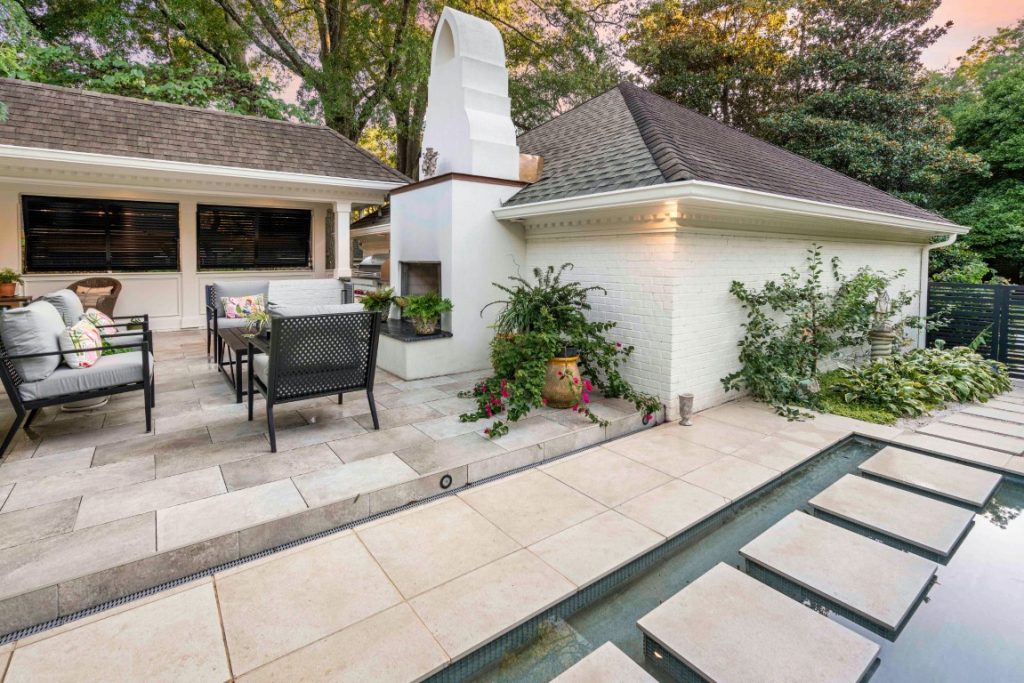
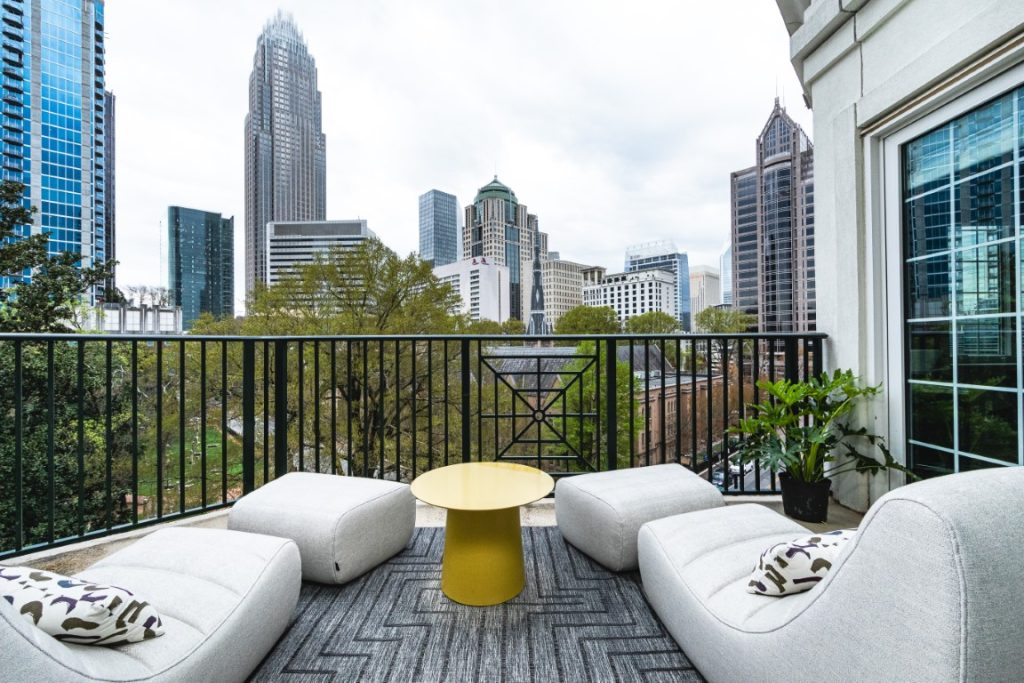
Outdoor Living Space Expansions
Charlotte’s temperate climate makes outdoor living spaces natural extensions of the home, usable for much of the year. In 2025, outdoor renovations have evolved far beyond basic patios and decks to create sophisticated exterior rooms that rival interior spaces in both comfort and functionality.
Covered Patios and Outdoor Kitchens
Covered patios with permanent roof structures have become essential features in upscale Charlotte homes, providing protection from both sun and rain while maintaining connection to the outdoors. These structures often include ceiling fans, recessed lighting, and even integrated heating elements to extend usability through cooler months.
Outdoor kitchens have evolved from simple grilling stations to comprehensive cooking environments with built-in appliances, storage, and countertop space. Premium outdoor kitchens now frequently include:
- Built-in gas grills with side burners
- Pizza ovens and smokers
- Refrigeration and ice makers
- Sink and cleanup stations
- Weather-resistant cabinetry
- Durable countertops in granite or concrete
- Bar seating for social interaction during meal preparation
These sophisticated outdoor cooking spaces allow homeowners to entertain without shuttling between indoor and outdoor areas, enhancing both convenience and social experience.
Landscaping and Hardscaping
Professional landscaping has become a significant component of outdoor renovations, with emphasis on creating low-maintenance, drought-resistant plantings that provide year-round visual interest. Native plant selections that thrive in Charlotte’s climate require less water and chemical intervention while supporting local ecosystems.
Hardscaping elements like stone pathways, retaining walls, and decorative borders define outdoor spaces and create visual structure. These permanent features add architectural interest while reducing ongoing maintenance requirements. Outdoor lighting integrated into hardscaping illuminates pathways for safety while highlighting landscape features and architectural elements after dark.
Pool and Water Feature Additions
Pool additions represent substantial investments but deliver significant lifestyle enhancements in Charlotte’s warm climate. Modern pool designs emphasize clean lines and integration with surrounding landscape, often incorporating features like:
- Zero-entry access points
- Built-in seating ledges
- Attached spas with independent temperature controls
- Automated covers for safety and heat retention
- Salt-water chlorination systems
- Smart controls for remote operation
For homeowners seeking water elements without the maintenance requirements of full pools, smaller water features like fountains, waterfalls, and reflecting pools add sensory richness through sound and movement. These features create focal points in outdoor spaces while masking ambient noise from neighboring properties or nearby streets.
Home Office Renovations
The continued evolution of remote and hybrid work arrangements has cemented home offices as essential spaces rather than temporary adaptations. Charlotte homeowners are investing in thoughtfully designed workspaces that support productivity while complementing residential aesthetics.
Dedicated Workspace Design Considerations
Effective home office renovations prioritize separation from household activities while maintaining connection to the home’s overall design language. Converting formal dining rooms, rarely used guest bedrooms, or portions of finished basements into dedicated workspaces provides the necessary buffer from domestic distractions.
Ergonomics has become a central consideration in home office design, with investments in proper lighting, adjustable-height desks, and supportive seating that promotes physical wellbeing during extended work sessions. Natural light is prioritized whenever possible, with window placements and treatments that minimize screen glare while maximizing daylight exposure.
Acoustic treatments like insulated walls, solid-core doors, and sound-absorbing materials create environments conducive to concentration and professional video conferencing. These features are increasingly integrated into architectural elements rather than added as afterthoughts, resulting in spaces that feel purposefully designed rather than hastily converted.
Technology Integration and Connectivity
Robust technological infrastructure forms the foundation of effective home office renovations. Dedicated electrical circuits prevent overloads from multiple devices, while strategically placed outlets and charging stations eliminate unsightly cord management issues.
High-speed internet connectivity has become non-negotiable, with hardwired ethernet connections supplementing wireless networks for maximum reliability during critical work functions. Whole-home mesh networks ensure consistent coverage throughout the property, supporting flexibility in work locations.
Integrated audiovisual systems facilitate professional video conferencing, with consideration given to camera angles, background aesthetics, and lighting quality. Built-in speakers, microphones, and display screens create seamless technology experiences that enhance productivity while maintaining residential comfort.
Multi-functional Space Planning
Even dedicated home offices benefit from flexibility that accommodates evolving needs. Thoughtful renovations often incorporate secondary functions like:
- Guest accommodations through murphy beds or convertible furniture
- Reading nooks or small library areas
- Hobby spaces with appropriate storage
- Small meeting areas for occasional in-person collaboration
These multi-functional approaches maximize the utility of square footage while ensuring spaces remain relevant as work arrangements continue to evolve.
Basement and Attic Conversions
Finished basements and converted attics represent some of the most cost-effective ways to expand usable living space without increasing a home’s footprint. These renovations transform underutilized areas into valuable square footage that can serve diverse functions.
Expanding Usable Living Space
Basement renovations in Charlotte must address moisture management as a primary concern, with proper waterproofing, drainage solutions, and dehumidification systems creating comfortable, dry environments. Modern basement conversions often include full-height ceilings, enlarged egress windows, and walkout access where topography permits, eliminating the subterranean feeling associated with older basement spaces.
Attic conversions require careful structural assessment to ensure floor joists can support intended uses, with potential reinforcement needs factored into renovation budgets. Dormers and skylights introduce natural light while creating additional headroom, transforming formerly cramped storage areas into inviting living spaces with architectural character.
Both basement and attic conversions typically require significant investments in insulation, HVAC extensions, and electrical upgrades to create comfortable, code-compliant environments. These infrastructure improvements, while less visually dramatic than cosmetic changes, are essential for successful space conversions.
Entertainment Areas and Specialty Rooms
Media rooms with optimized acoustics, lighting control, and comfortable seating have become popular basement conversion choices, creating dedicated entertainment spaces that don’t compete with other household activities. These purpose-built environments often include sound isolation features that prevent noise transfer to other areas of the home.
Home gyms with proper flooring, ventilation, and equipment storage represent another valuable conversion option, eliminating commute time to fitness facilities while providing privacy for workouts. Mirrors, specialized lighting, and even shower facilities can be incorporated to create comprehensive wellness spaces.
Specialty rooms like wine cellars, craft studios, or game rooms allow homeowners to dedicate space to specific interests and hobbies. These personalized environments enhance lifestyle quality while potentially adding unique selling points when the property eventually changes hands.
Guest Suites and Rental Potential
Complete guest suites with private bathrooms and small kitchenettes create independent living spaces for visiting friends and family or returning adult children. These self-contained areas provide privacy and autonomy for both hosts and guests during extended stays.
In neighborhoods where zoning permits, basement apartments with separate entrances can generate rental income while maintaining privacy for the primary residence. These income-producing renovations require careful attention to building codes, particularly regarding egress requirements, fire separation, and utility metering.
The flexibility to accommodate multigenerational living arrangements has become increasingly valuable in Charlotte’s real estate market, with properties offering independent living spaces commanding premium prices. These adaptable spaces support evolving family structures while providing options for aging in place with caregiver accommodation.
Get a FREE Custom Quote in MinutesRenovation Costs by Charlotte Neighborhood
Charlotte’s diverse neighborhoods each have their own architectural character, property values, and renovation expectations. Understanding these neighborhood-specific factors is essential when planning a renovation budget that will deliver appropriate return on investment. While quality craftsmanship and materials are universal values across Charlotte, the scope and scale of renovations should align with neighborhood standards to avoid overcapitalization.
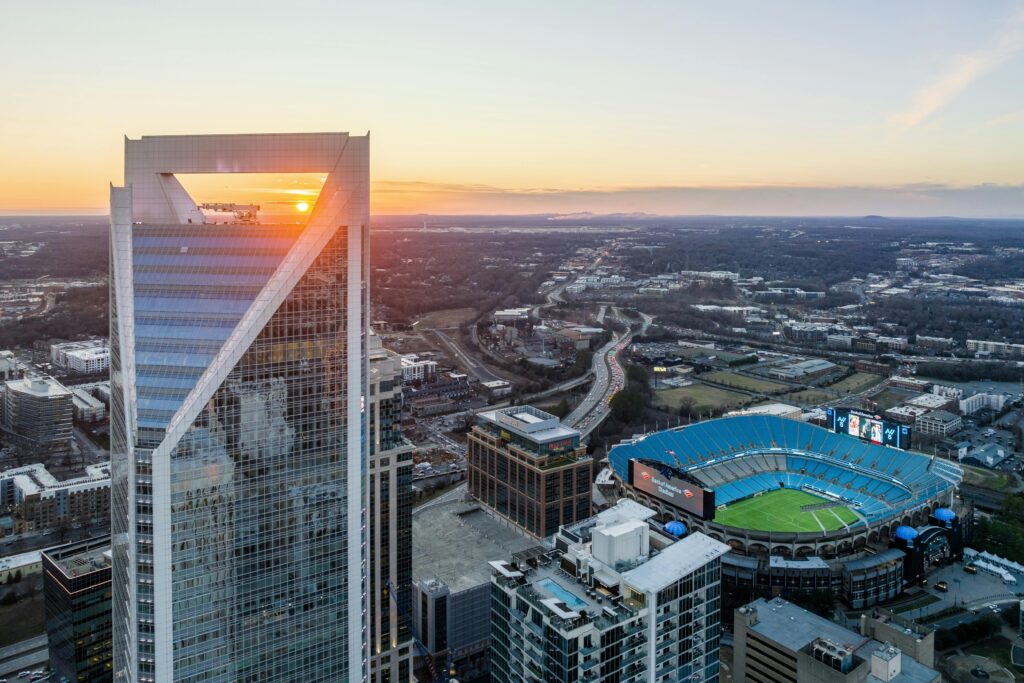

Dilworth
Dilworth is renowned for its historic charm and architectural diversity, featuring Queen Anne, colonial revival, Tudor revival, and bungalow homes nestled among mature oak trees. Listed on the National Register of Historic Places, this vibrant neighborhood is a hub of community spirit, with residents enjoying a variety of wine bars, coffee shops, and local eateries.
Renovation costs in Dilworth reflect both the neighborhood’s premium status and the challenges of updating historic properties. A bathroom remodel in Dilworth will cost an average of $60,000 to $110,000, with higher-end projects often exceeding this range due to the need for custom solutions that preserve architectural integrity while incorporating modern amenities.
Kitchen renovations in Dilworth typically start around $125,000 for semi-custom projects and can exceed $200,000 for comprehensive renovations that expand space or modify structural elements. The neighborhood’s historic designation may require additional approvals for exterior modifications, potentially adding time and complexity to renovation projects.
Myers Park
Myers Park is a prestigious Charlotte suburb known for its winding paths, ancient oaks, and stunning gardens. This “garden suburb” boasts an array of historic mansions and diverse architectural styles, including colonial revival, Tudor revival, bungalow, and Georgian colonial homes. The neighborhood’s charm is further enhanced by the beautiful Queens University of Charlotte campus, top-rated schools, and a vibrant mix of bars, restaurants, and parks.
As one of Charlotte’s most exclusive neighborhoods, Myers Park renovation budgets typically reflect the high property values and sophisticated expectations of area homeowners. A bathroom remodel in Myers Park will cost an average of $60,000 to $110,000, with luxury primary bathroom renovations often exceeding $160,000 when incorporating premium materials and custom features.
Kitchen renovations in Myers Park frequently fall at the higher end of Charlotte’s range, with comprehensive projects typically starting around $150,000 and often exceeding $250,000 for luxury renovations that include high-end appliances, custom cabinetry, and architectural enhancements. The investment in quality renovations is typically justified by the neighborhood’s strong property values and buyer expectations.
Foxcroft
Foxcroft is a prestigious Charlotte neighborhood renowned for its stately homes, expansive lots, and mature tree canopy. This upscale community, situated in the desirable SouthPark area, offers a blend of historic charm and modern luxury. Residents enjoy proximity to the exclusive boutiques and fine dining of SouthPark Mall, as well as the recreational opportunities at nearby Carmel Road Park. The neighborhood’s architectural landscape is diverse, featuring a mix of traditional and contemporary styles, with many homes undergoing significant renovations to incorporate modern amenities and design trends.
Renovation costs in Foxcroft reflect the neighborhood’s high property values and the demand for luxury finishes. A high-end kitchen remodel in Foxcroft can range from $150,000 to over $250,000, while a primary bathroom renovation typically falls between $75,000 and $150,000. Whole-house renovations are also common, with budgets often exceeding $500,000 to transform older properties into modern luxury homes.
Eastover
Eastover is one of Charlotte’s most affluent and historic neighborhoods, characterized by its grand homes, tree-lined streets, and proximity to the city’s cultural attractions. The neighborhood is home to the Mint Museum Randolph and is just a short drive from the shops and restaurants of Myers Park and Elizabeth. Eastover’s real estate market is among the most expensive in Charlotte, with a mix of historic mansions and newer custom-built homes.
Renovations in Eastover often involve preserving the historic character of the homes while incorporating modern luxuries. Kitchen remodels in this neighborhood can range from $125,000 to $225,000, while bathroom renovations typically cost between $60,000 and $120,000. Given the high property values, homeowners in Eastover often undertake extensive renovations to maintain the value and appeal of their homes.
Pellyn Wood
Pellyn Wood is an exclusive, wooded neighborhood in the SouthPark area, known for its large, custom-built homes on spacious lots. The neighborhood offers a sense of privacy and seclusion while being just minutes from the amenities of SouthPark. Pellyn Wood is characterized by its rolling hills, mature trees, and a mix of architectural styles, from traditional to contemporary.
Renovation projects in Pellyn Wood often focus on modernizing and expanding the existing homes. Kitchen renovations in this area can range from $150,000 to $300,000, while primary bathroom remodels typically cost between $80,000 and $160,000. Given the large size of the homes and lots, outdoor living projects, such as pools and patios, are also popular and can add significant value to the properties.
Carmel
Carmel is a well-established neighborhood in South Charlotte, known for its large, traditional homes and beautiful, tree-lined streets. The neighborhood is conveniently located near SouthPark and offers a strong sense of community. Carmel is a popular choice for families, with its excellent schools and recreational opportunities.
Renovations in Carmel often involve updating older homes to meet modern standards. Kitchen remodels in this neighborhood can range from $100,000 to $200,000, while bathroom renovations typically cost between $50,000 and $100,000. Many homeowners also choose to add on to their homes to create more living space for their families.
Barclay Downs
Barclay Downs is a popular SouthPark neighborhood known for its classic brick ranch homes and convenient location. The neighborhood is within walking distance of SouthPark Mall and the Morrison Shopping Center, offering residents easy access to shopping, dining, and entertainment. Barclay Downs has a strong community feel, with a neighborhood swim and racquet club.
Renovations in Barclay Downs often involve opening up the floor plans of the traditional ranch homes and updating the kitchens and bathrooms. Kitchen remodels in this area can range from $80,000 to $150,000, while bathroom renovations typically cost between $40,000 and $80,000. Many homeowners also choose to add a second story to their homes to increase their living space.
Madison Park
Madison Park is a charming, established neighborhood located between South End and SouthPark. It features a mix of brick ranch homes and new construction, attracting a diverse range of residents. The neighborhood is known for its tree-lined streets, friendly atmosphere, and convenient access to the Lynx Blue Line light rail.
Renovations in Madison Park are common, with many homeowners updating the original 1950s and 1960s homes. Kitchen remodels in this area typically range from $75,000 to $125,000, while bathroom renovations can cost between $35,000 and $70,000. Many residents also invest in additions and outdoor living spaces to maximize their property’s potential.
Sedgefield
Sedgefield is a rapidly transitioning neighborhood located between South End and Dilworth. It is known for its mix of original bungalows and new, larger homes. The neighborhood’s prime location, with easy access to Uptown and the amenities of South End, has made it a popular choice for young professionals and families.
Renovation activity is high in Sedgefield, with many of the smaller, older homes being either significantly remodeled or replaced with new construction. A kitchen remodel in a Sedgefield home can range from $90,000 to $160,000, while a bathroom renovation may cost between $45,000 and $90,000. Full gut renovations and additions are also common as homeowners look to customize their homes in this desirable location.
Mountainbrook
Mountainbrook is a quiet, residential neighborhood in South Charlotte, known for its large, traditional homes and spacious, wooded lots. The neighborhood has a suburban feel while still being conveniently located to the SouthPark area. Mountainbrook is a popular choice for those seeking a peaceful retreat with easy access to city amenities.
Renovations in Mountainbrook often focus on updating and modernizing the existing homes. Kitchen remodels in this neighborhood can range from $125,000 to $225,000, while primary bathroom renovations typically cost between $60,000 and $120,000. Many homeowners also invest in creating luxurious outdoor living spaces to take advantage of their large lots.
Selwyn
Selwyn is a desirable neighborhood located near Myers Park and SouthPark, known for its beautiful, tree-lined streets and a mix of architectural styles. The neighborhood has a classic, established feel and is home to Selwyn Elementary School, one of the top-rated schools in Charlotte. Its central location and strong community make it a highly sought-after area.
Renovations in Selwyn often involve preserving the character of the older homes while updating them for modern living. Kitchen remodels in this area can range from $100,000 to $200,000, while bathroom renovations typically cost between $50,000 and $100,000. Additions and outdoor living projects are also popular as homeowners look to enhance their living spaces.
Quail Hollow
Quail Hollow is a prestigious South Charlotte neighborhood best known for the Quail Hollow Club, which hosts the Wells Fargo Championship, a regular stop on the PGA Tour. The neighborhood features large, luxurious homes on spacious lots, many with golf course views. Quail Hollow is a gated community, offering residents privacy and security.
Renovations in Quail Hollow are typically high-end, reflecting the neighborhood’s luxury status. Kitchen remodels in this area can start at $150,000 and exceed $300,000, while primary bathroom renovations often range from $80,000 to $200,000. Custom, large-scale renovations are common as homeowners seek to create their dream homes in this exclusive community.
Providence Plantation
Providence Plantation is a large, sought-after neighborhood in South Charlotte, known for its spacious homes, large lots, and mature trees. The neighborhood has a strong sense of community, with an active homeowners association and a swim and racquet club. Providence Plantation is also known for its top-rated schools, making it a popular choice for families.
Renovations in Providence Plantation often involve updating and expanding the original homes, which were primarily built in the 1970s and 1980s. Kitchen remodels in this area can range from $100,000 to $200,000, while bathroom renovations typically cost between $50,000 and $100,000. Many homeowners also invest in additions and outdoor living spaces to create more room for their families.
Piper Glen
Piper Glen is a large, master-planned community in South Charlotte, built around the TPC Piper Glen golf course. The neighborhood offers a wide range of housing options, from single-family homes to townhomes, and a variety of amenities, including a clubhouse, pool, and tennis courts. Piper Glen is conveniently located near the Ballantyne area and I-485.
Renovations in Piper Glen vary depending on the age and style of the home. Kitchen remodels can range from $90,000 to $180,000, while bathroom renovations typically cost between $45,000 and $90,000. Many homeowners also choose to update their outdoor living spaces to take advantage of the beautiful golf course views.
Ballantyne Country Club
Ballantyne Country Club is a premier, gated community in the heart of the Ballantyne area. The neighborhood is built around a Rees Jones-designed golf course and offers a luxurious lifestyle with a wide range of amenities, including a clubhouse, pool, tennis courts, and fitness center. Ballantyne Country Club is known for its large, custom-built homes and beautiful, manicured landscapes.
Renovations in Ballantyne Country Club are typically high-end, reflecting the neighborhood’s luxury status. Kitchen remodels in this area can start at $150,000 and exceed $300,000, while primary bathroom renovations often range from $80,000 to $200,000. Custom, large-scale renovations are common as homeowners seek to create their dream homes in this exclusive community.
Weddington & Marvin
Weddington and Marvin are two of the most sought-after suburban towns in the Charlotte metropolitan area, located in Union County, just south of Mecklenburg County. Known for their large, luxurious homes, expansive lots, and top-rated schools, these towns attract affluent families seeking a high quality of life with a more rural feel, while still being within a reasonable commute to Charlotte. Both Weddington and Marvin have a strong focus on preserving green space and maintaining a low-density residential character.
Renovations in Weddington and Marvin are often large-scale projects, reflecting the size and value of the homes in the area. Kitchen remodels in these towns can easily range from $150,000 to $350,000, often featuring high-end appliances, custom cabinetry, and expansive islands. Primary bathroom renovations are also significant investments, typically costing between $80,000 and $200,000 for a spa-like retreat. Given the large lots, outdoor living is a major focus, with many homeowners investing in elaborate pools, outdoor kitchens, and landscaping projects that can exceed $250,000.
Lake Norman
Lake Norman is a large, man-made lake located north of Charlotte, and it is a popular destination for boating, fishing, and other water sports. The area around Lake Norman has become a desirable place to live, with a number of upscale communities offering a resort-like lifestyle. These neighborhoods attract residents who are looking for a waterfront or water-access home with a strong sense of community and a wide range of amenities.
The Point
The Point is a premier, gated community located on a peninsula on Lake Norman in Mooresville. The neighborhood is built around a Greg Norman-designed golf course and offers a luxurious lifestyle with a wide range of amenities, including a clubhouse, pool, tennis courts, and a full-service marina. The Point is known for its large, custom-built homes, many of which are waterfront with private docks.
Renovations in The Point are typically high-end, reflecting the neighborhood’s luxury status. Kitchen remodels in this area can start at $200,000 and exceed $400,000, while primary bathroom renovations often range from $100,000 to $250,000. Custom, large-scale renovations are common as homeowners seek to create their dream homes in this exclusive community.
The Peninsula Club
The Peninsula Club is a premier, private country club community located on Lake Norman in Cornelius. The neighborhood is nestled along 11 miles of scenic shoreline and is built around a Rees Jones-designed golf course. The Peninsula Club offers a family-centric country club experience with a wide range of amenities, including a clubhouse, pool, tennis courts, and a marina. The neighborhood features a mix of large, custom-built homes, many of which are waterfront.
Renovations in The Peninsula Club are typically high-end, reflecting the neighborhood’s luxury status. Kitchen remodels in this area can start at $150,000 and exceed $300,000, while primary bathroom renovations often range from $80,000 to $200,000. Custom, large-scale renovations are common as homeowners seek to create their dream homes in this exclusive community.
Norman Shores
Norman Shores is a waterfront community on Lake Norman in Cornelius. The neighborhood features a mix of home styles and sizes, from smaller, older homes to new construction. Norman Shores offers residents a more relaxed, lake-living lifestyle with a strong sense of community.
Renovations in Norman Shores vary depending on the age and style of the home. Kitchen remodels can range from $80,000 to $150,000, while bathroom renovations typically cost between $40,000 and $80,000. Many homeowners also choose to update their outdoor living spaces to take advantage of the beautiful lake views.
Torrence Chapel
Torrence Chapel is a road and an area in Cornelius that has a mix of residential and commercial development. The area is conveniently located near I-77 and offers easy access to the amenities of both Cornelius and the greater Lake Norman area. The residential areas along Torrence Chapel Road feature a variety of housing options, from single-family homes to apartments.
Renovation costs in the Torrence Chapel area will vary widely depending on the specific neighborhood and type of home. However, given the area’s proximity to the lake and its convenient location, renovations can be a good investment.
Langtree and Cornelius
Langtree is a mixed-use development located in Mooresville, on the shores of Lake Norman. It features a mix of residential, retail, and office space, as well as a hotel and a marina. Langtree offers a vibrant, urban-style living experience in a suburban setting. Cornelius is a town located on the shores of Lake Norman, and it is a popular destination for those seeking a lakefront lifestyle. The town offers a wide range of housing options, from condos and townhomes to large, single-family homes. Cornelius has a charming downtown area with a variety of shops and restaurants.
Renovation costs in Langtree and Cornelius will vary depending on the type of property and the scope of the project. However, with the continued growth and development in the Lake Norman area, renovations can be a good way to add value to your home.
Elizabeth
Elizabeth is celebrated for its pedestrian-friendly atmosphere, blending urban hustle with a relaxed, welcoming vibe. This neighborhood offers the best of both worlds: the serene Independence Park for picnics, rose garden strolls, and walking trails, alongside quick streetcar access to Uptown’s live music and entertainment.
Renovation costs in Elizabeth reflect the neighborhood’s mix of historic homes and more contemporary properties. A bathroom remodel in Elizabeth will cost an average of $60,000 to $110,000, with costs varying based on the age of the home and existing conditions. Older homes may require additional investment in updating plumbing and electrical systems to support modern fixtures and appliances.
Kitchen renovations in Elizabeth typically range from $100,000 to $200,000, depending on scope and material selections. The neighborhood’s diverse architectural styles allow for more design flexibility than strictly historic districts, though many homeowners choose to preserve period details that contribute to Elizabeth’s distinctive character.
Plaza Midwood
Plaza Midwood is a harmonious blend of historic architecture, vibrant murals, upscale dining, dive bars, and a mix of high-end and vintage shopping. This trendy yet timeless neighborhood offers a rich array of activities, from a thriving restaurant scene and galleries to live music and bi-annual festivals.
Renovation costs in Plaza Midwood reflect the neighborhood’s eclectic character and growing popularity. A bathroom remodel in Plaza Midwood will cost an average of $60,000 to $110,000, with many homeowners embracing bold design choices that reflect the area’s artistic spirit.
Kitchen renovations in Plaza Midwood typically range from $100,000 to $180,000, with emphasis often placed on creating spaces that support entertaining and social interaction. The neighborhood’s mix of traditional and contemporary homes allows for diverse design approaches, from preserving vintage details to embracing modern industrial aesthetics.
Montibello
Montibello offers an ideal blend of serene neighborhood living and easy access to Charlotte’s amenities. The neighborhood’s appeal is enhanced by its stately homes with expansive yards and mature trees, contributing to robust property values and a strong sense of community.
Renovation costs in Montibello typically align with the neighborhood’s upscale character and larger home sizes. Bathroom renovations in this area often include more square footage than in older neighborhoods, with corresponding increases in material quantities and costs. The neighborhood’s newer construction may require fewer infrastructure updates than historic districts, potentially offsetting some renovation expenses.
Kitchen renovations in Montibello frequently incorporate large islands, walk-in pantries, and connections to outdoor living spaces, reflecting contemporary lifestyle preferences. These expansive projects typically range from $125,000 to $225,000, depending on material selections and scope.
Factors Affecting Cost Variations Between Neighborhoods
Several key factors contribute to renovation cost variations across Charlotte neighborhoods:
Property Age and Condition
Older homes in historic neighborhoods like Dilworth and Myers Park often require additional infrastructure updates when undertaking major renovations. These might include:
- Electrical panel upgrades to support modern appliances and technology
- Plumbing system replacements to address deteriorated pipes and improve water pressure
- Structural reinforcements to support new layouts or heavier materials
- Insulation improvements to enhance energy efficiency
While these infrastructure investments add to initial renovation costs, they represent valuable improvements to the home’s long-term functionality and safety.
Architectural Considerations
Homes with distinctive architectural styles may require specialized approaches to preserve character-defining features while incorporating modern amenities. This often involves:
- Custom millwork to match existing trim profiles
- Specialized materials that complement original elements
- Creative space planning that respects architectural integrity
- Restoration of period details like plaster walls or decorative ceilings
These customized solutions typically cost more than standardized approaches but maintain the authentic character that contributes to neighborhood appeal and property value.
Permit and Approval Requirements
Historic districts and neighborhoods with architectural review boards may have additional approval requirements that impact both renovation timelines and costs. These might include:
- Historic district commission reviews for exterior modifications
- Homeowner association approvals for certain design elements
- Specialized permits for work on designated historic properties
- Restrictions on material selections or architectural changes
Working with renovation professionals familiar with neighborhood-specific requirements can help navigate these processes efficiently while ensuring compliance with all applicable regulations.
Neighborhood Expectations and Standards
Each Charlotte neighborhood has evolved its own standards for renovation quality and design, reflecting both property values and community preferences. Aligning renovation investments with these neighborhood expectations helps ensure appropriate return on investment while contributing positively to community character.
Understanding these neighborhood-specific factors is essential when planning renovation budgets that will deliver both personal satisfaction and financial returns. Working with design and construction professionals experienced in your specific neighborhood can provide valuable insights into local standards, challenges, and opportunities.
Get a FREE Custom Quote in MinutesPermits and Regulations for Charlotte Home Renovations
Navigating permits and regulations is a critical aspect of any home renovation project in Charlotte. While the permitting process may seem daunting, understanding when permits are required and how to obtain them is essential for ensuring your renovation is safe, legal, and won’t cause complications when selling your home in the future. This section provides a comprehensive overview of Charlotte’s permitting requirements for home renovations.
When Permits Are Required
In Charlotte and Mecklenburg County, permits are generally required for any project that involves structural changes, electrical work, plumbing modifications, or mechanical system alterations. The basic guidelines for when permits are required include:
Projects Over $40,000
Any renovation project with a total cost exceeding $40,000 requires a permit, regardless of the specific work being performed. This threshold captures most significant renovation projects, including kitchen and bathroom remodels, room additions, and major interior renovations.
Projects Involving Structural Elements
Renovations that modify or affect the structural integrity of your home require permits regardless of cost. These include:
- Removing or altering load-bearing walls
- Modifying roof structures
- Adding or enlarging window and door openings
- Building additions or extensions
- Deck construction or significant modifications
- Foundation repairs or modifications
These projects have direct implications for the structural safety of your home and require professional engineering and inspection to ensure proper execution.
Electrical, Mechanical, and Plumbing System Work
Any work involving these critical systems requires permits regardless of project cost:
- Electrical system modifications or additions
- New or relocated electrical outlets, switches, or fixtures
- HVAC system installations or modifications
- Water heater replacements
- Plumbing line modifications or additions
- Gas line installations or modifications
These systems directly impact life safety through fire prevention, air quality, and sanitation, making proper installation and inspection essential.
Common Projects Requiring Permits
Deck Additions and Replacements
Deck construction or significant modifications require permits to ensure proper structural support, appropriate attachment to the home, and compliance with safety standards for railings and stairs. Even replacing an existing deck typically requires a permit if the footprint, height, or structural elements change.
Pool Installations
Swimming pool installations require permits to ensure proper electrical safety, adequate barriers to prevent unauthorized access, and appropriate structural engineering for in-ground installations. Both in-ground and above-ground pools exceeding certain depths require permits and inspections.
Room Conversions and Additions
Converting spaces like garages to living areas or adding new rooms requires permits to ensure proper insulation, ventilation, egress for emergency escape, and structural support. These projects often involve multiple building systems and require comprehensive plan review.
Major Kitchen and Bathroom Upgrades
Significant kitchen and bathroom renovations typically require permits, particularly when they involve:
- Relocating plumbing fixtures
- Adding new electrical circuits
- Modifying ventilation systems
- Removing or altering walls
- Installing new windows or exterior doors
Even if the renovation maintains the existing layout, permits are required if the project exceeds the $20,000 threshold or involves substantial changes to electrical, plumbing, or mechanical systems.
Permit Process in Charlotte
How to Apply for Permits
The permitting process in Mecklenburg County follows these general steps:
- Determine permit requirements: Contact the Code Information & Resource Center (CIRC) at 980-314-CODE to confirm which permits your specific project requires.
- Prepare required documentation: Depending on project scope, this may include:
- Detailed project plans
- Site plans showing property boundaries and structure locations
- Structural calculations for certain projects
- Contractor information and license numbers
- Submit application: Most permits can be applied for online through the Mecklenburg County Code Enforcement website (meckpermit.com). Some complex projects may require in-person submission.
- Pay fees: Permit fees vary based on project type and value. Fee schedules are available on the Mecklenburg County website.
- Receive permit: Once approved, you’ll receive your permit, which must be displayed at the project site during construction.
Typical Timeline for Permit Approval
Permit approval timelines vary based on project complexity and current department workload:
- Simple permits for minor projects may be issued instantly online or within a few days.
- Standard residential renovation permits typically take 10-15 business days for review and approval.
- Complex projects involving structural modifications or historic properties may require 2-4 weeks for approval.
Planning for these timeframes is essential when developing your renovation schedule. Attempting to expedite construction by starting work before permits are issued can result in significant penalties and project delays.
Inspections and Compliance Requirements
Once permits are issued and work begins, various inspections are required at different stages of the project:
- Rough-in inspections: These occur before walls are closed up and verify that electrical wiring, plumbing pipes, and mechanical systems are properly installed.
- Framing inspections: These verify that structural elements are properly constructed and secured.
- Final inspections: These comprehensive reviews ensure all aspects of the project meet code requirements before the space is used.
Scheduling inspections is the responsibility of the homeowner or contractor, and work cannot proceed past certain stages without required inspection approvals. Failed inspections require corrections and re-inspection before work can continue.
Working with Contractors vs. DIY Considerations
Homeowner Responsibilities
Whether hiring a contractor or doing the work yourself, as the homeowner, you are ultimately responsible for ensuring all necessary permits are obtained before work begins. When selling your home, unpermitted work can create significant complications, including:
- Requirements to open up finished walls for inspection
- Potential removal of non-compliant installations
- Difficulty obtaining insurance coverage
- Reduced property value
- Liability for safety issues
Tracking the progress of permits and inspections is essential, even when working with professional contractors. You can monitor permit status and inspection results online through the Mecklenburg County Code Enforcement website.
Contractor Licensing Requirements
In North Carolina, contractors must be licensed for projects exceeding $30,000. Different license classifications exist for general contractors, electrical contractors, plumbing contractors, and mechanical contractors. When hiring professionals, verify:
- Current license status through the NC Licensing Board
- Appropriate insurance coverage
- Experience with similar projects
- Familiarity with Charlotte-specific requirements
Licensed contractors typically handle permit applications as part of their services, but homeowners should confirm this responsibility is clearly defined in project contracts.
Potential Issues with Unpermitted Work
Completing renovations without required permits creates significant risks:
- Safety hazards from work not meeting current code requirements
- Potential voiding of homeowner’s insurance for damages related to unpermitted work
- Complications when selling the property, including disclosure requirements and potential deal-breakers
- Penalties and fines from Mecklenburg, Union and surrounding Counties
- Potential requirements to remove and replace unpermitted work
The cost and inconvenience of obtaining proper permits is minimal compared to the potential consequences of proceeding without them. When in doubt about permit requirements, consulting with the Code Information & Resource Center provides clarity without risk.
By understanding and following Charlotte’s permitting requirements, you ensure your renovation not only enhances your home’s beauty and functionality but also its safety, legality, and long-term value. Working with experienced professionals familiar with local requirements can significantly streamline this process while providing peace of mind that your project meets all applicable standards.
Get a FREE Custom Quote in MinutesChoosing the Right Renovation Contractor in Charlotte
Selecting the right contractor is perhaps the most critical decision in your renovation journey. The quality of your contractor directly impacts the success of your project, from design vision and material selection to construction quality and long-term satisfaction. In Charlotte’s competitive renovation market, understanding how to evaluate and select the ideal contractor for your specific project can make the difference between a stressful experience and a rewarding transformation of your home.
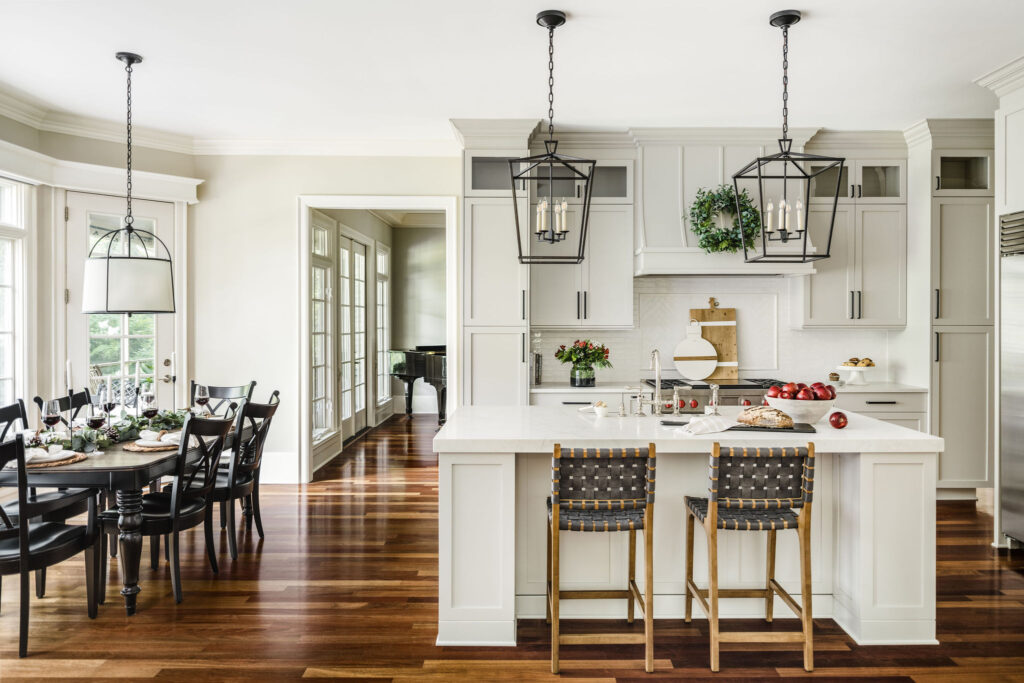
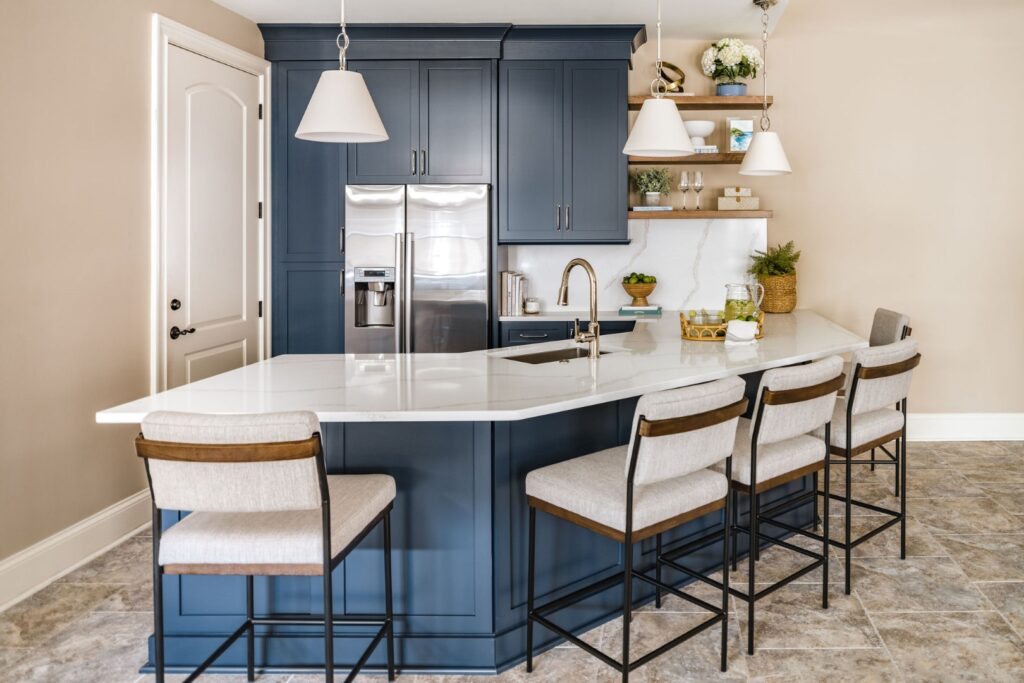
What to Look for in a Home Renovation Contractor
Experience and Portfolio
When evaluating potential contractors for your Charlotte home renovation, experience in similar projects should be a primary consideration. Look for contractors with:
- Significant experience (ideally 10+ years) in residential renovations
- Demonstrated expertise in projects similar to yours in scope and style
- Experience working in your specific neighborhood, particularly for historic districts with unique requirements
- A robust portfolio of completed projects that align with your aesthetic preferences
A contractor’s portfolio reveals not only their technical capabilities but also their design sensibilities and attention to detail. Request to see before-and-after photos of completed renovations, particularly those similar to your planned project. The most qualified contractors will have extensive documentation of their work and will be proud to share their achievements.
Licensing and Insurance
Proper credentials are non-negotiable when selecting a renovation contractor in Charlotte:
- Verify current North Carolina contractor licensing appropriate for your project scope
- Confirm comprehensive liability insurance (minimum $1 million coverage)
- Verify workers’ compensation coverage for all employees and subcontractors
- Check for any specialized certifications relevant to your project (historic preservation, green building, etc.)
The North Carolina Licensing Board for General Contractors provides online verification of licensing status, which should be your first step in vetting potential contractors. Never work with unlicensed contractors, regardless of price advantages they may offer, as this exposes you to significant liability and offers no protection against substandard work.
Specialization in High-End Renovations
Luxury home renovations require specialized expertise beyond standard construction knowledge:
- Familiarity with premium materials and their proper installation
- Relationships with high-quality specialty subcontractors
- Experience coordinating complex projects with multiple design elements
- Understanding of luxury market expectations and standards
- Ability to source unique or custom materials and fixtures
Contractors who specialize in high-end renovations typically maintain relationships with skilled craftspeople and artisans who can execute custom elements that distinguish luxury projects. This network of specialized talent is often as valuable as the contractor’s own capabilities.
Questions to Ask Potential Contractors
Project Timeline and Process
Understanding how a contractor approaches project management provides insight into their professionalism and organization:
- What is your typical process from contract signing to project completion?
- How do you develop and communicate the project schedule?
- What is the estimated timeline for a project of this scope?
- How do you handle inevitable delays in materials or subcontractor availability?
- Who will be on-site managing the project daily?
- How frequently will the principal or project manager visit the site?
The most professional contractors will have established systems for project management, including detailed scheduling, regular client updates, and clear escalation procedures for addressing concerns.
Communication Methods
Effective communication is essential for successful renovation projects:
- Who will be your primary contact throughout the project?
- What is the expected response time for questions or concerns?
- How frequently will you provide progress updates?
- What technology platforms do you use for project communication and documentation?
- How do you handle change orders and project modifications?
- What is your process for addressing concerns or disagreements?
The best contractors maintain transparent, responsive communication throughout the project, with clear channels for both routine updates and urgent matters. They should be able to explain their communication protocols in detail, demonstrating that they have established systems rather than ad hoc approaches.
Warranty and Post-Project Support
A contractor’s commitment to their work extends beyond project completion:
- What warranty do you provide on workmanship?
- How do you handle warranty claims or issues that arise after completion?
- What is your typical response time for post-completion concerns?
- Do you provide maintenance recommendations for newly renovated spaces?
- Can you provide references from clients whose projects were completed 2+ years ago?
Quality contractors stand behind their work with meaningful warranties and responsive post-project support. They view the completion of your renovation not as the end of the relationship but as the beginning of a long-term commitment to your satisfaction.
Red Flags to Watch For
Unusually Low Bids
While competitive pricing is desirable, bids significantly lower than others should raise concerns:
- Substantially lower bids often indicate corners will be cut on materials or labor
- Extremely low bids may not include all necessary components of the project
- Some contractors use low initial bids but make up the difference with numerous change orders
- Unrealistically low bids may indicate a contractor who is desperate for work due to reputation issues
A thorough bid should be itemized, allowing you to understand exactly what is included and providing a basis for comparison between contractors. When evaluating bids, focus on value rather than simply selecting the lowest price.
Pressure Tactics
Quality contractors respect your decision-making process and timeline:
- Be wary of contractors pushing for immediate decisions or deposits
- Legitimate contractors don’t offer special pricing “only if you sign today”
- High-pressure sales tactics often indicate a focus on securing contracts rather than delivering quality
- Reputable contractors understand that significant investments require thoughtful consideration
The best renovation partners will encourage you to conduct due diligence, check references, and feel completely comfortable before proceeding with your project.
Lack of Proper Documentation
Professional contractors maintain comprehensive documentation:
- Detailed, written estimates specifying materials, labor, and timeline
- Proof of insurance and licensing readily available upon request
- Formal contracts that protect both parties
- Systematic change order processes
- Clear payment schedules tied to project milestones
- Written warranties for completed work
Hesitation to provide proper documentation or preference for verbal agreements over written contracts should be considered serious warning signs, regardless of how personable or knowledgeable the contractor may seem.
Why Watershed Builders Excels at Charlotte Home Renovations
Company History and Expertise
Watershed Builders has established itself as a premier renovation contractor in Charlotte through decades of dedicated service to the community’s most discerning homeowners. Our team brings unparalleled expertise in transforming Charlotte’s diverse architectural styles, from historic bungalows in Dilworth to contemporary estates in Montibello.
Our extensive portfolio demonstrates mastery across all renovation categories, including:
- Comprehensive kitchen transformations
- Luxury bathroom renovations
- Outdoor living space expansions
- Whole-home renovations and additions
- Historic property restorations
This depth of experience allows us to anticipate challenges specific to Charlotte homes and proactively address them before they impact your project timeline or budget.
Unique Approach to Renovations
Watershed Builders distinguishes itself through a client-centered approach that prioritizes both exceptional craftsmanship and an enjoyable renovation experience:
- Dedicated project managers who serve as your single point of contact throughout the process
- Transparent communication through our proprietary client portal, providing real-time updates and documentation
- Detailed pre-construction planning that minimizes surprises and disruptions
- Relationships with Charlotte’s finest specialty subcontractors and artisans
- Comprehensive dust control and site protection protocols that respect your home
- Meticulous attention to detail in both visible finishes and behind-the-wall infrastructure
Our systematic approach combines the personalized attention of a boutique firm with the resources and capabilities of a larger organization, delivering consistent excellence across every project we undertake.
Get a FREE Custom Quote in MinutesThe Home Renovation Process with Watershed Builders
Understanding the renovation process before you begin can significantly reduce stress and ensure your project progresses smoothly from concept to completion. At Watershed Builders, we’ve refined our approach through years of experience renovating Charlotte’s finest homes, creating a systematic yet flexible process that delivers exceptional results while respecting your time and investment.
Initial Consultation and Design Phase
Understanding Client Needs and Vision
Every successful renovation begins with thorough discovery of your needs, preferences, and lifestyle:
- Comprehensive initial consultation to discuss your goals, budget, and timeline
- Detailed assessment of your existing space and its limitations
- Exploration of how you currently use the space and how you envision using it after renovation
- Discussion of aesthetic preferences, including architectural styles and design elements that resonate with you
- Review of inspiration images or examples you’ve collected
This discovery process allows us to understand not just what you want to change about your home, but why those changes matter to you. By identifying the underlying needs driving your renovation desire, we can often suggest solutions you might not have considered that address your core requirements even more effectively.
Design Review & Conceptual Guidance
While Watershed doesn’t offer in-house design services, we play a crucial role in reviewing and refining your design plans. If you’re working with a designer, we’ll collaborate to ensure your vision is practical, buildable, and aligned with your goals. If you don’t yet have a designer, we’re happy to recommend trusted professionals we’ve worked with.
As part of this early phase, we’ll help you evaluate key design elements such as:
- Proposed floor plans and spatial layouts
- Elevation drawings of key architectural features
- 3D renderings or conceptual visuals (if provided)
- Material selections and aesthetic direction
- Choices for cabinetry, countertops, flooring, and more
Our goal is to provide clear feedback and buildability insights, helping ensure your design is both beautiful and feasible, before moving into budgeting and construction planning.
Budget Development
Transparent budget development is essential for a successful renovation:
- Detailed preliminary budget based on conceptual designs
- Clear breakdown of costs by category (demolition, construction, finishes, etc.)
- Discussion of where flexibility exists within the budget
- Identification of potential cost drivers and value-engineering opportunities
- Establishment of contingency funds for unexpected discoveries
Our approach to budgeting emphasizes accuracy and transparency, providing you with realistic expectations from the beginning rather than enticing low estimates that inevitably increase. This honest approach builds trust and allows for informed decision-making throughout the project.
Planning and Permitting
Detailed Design Development
Once preliminary concepts are approved, we develop comprehensive design documentation:
- Detailed construction drawings specifying all dimensions and structural elements
- Electrical and lighting plans showing fixture locations and switch configurations
- Plumbing plans indicating fixture locations and water line routing
- Custom cabinetry designs with interior organization systems
- Tile layout patterns and installation details
These detailed plans eliminate ambiguity during construction, ensuring that all team members share a clear understanding of the intended outcome. Thorough planning at this stage prevents costly changes and delays during construction.
Material Selection
Material selection is a collaborative process guided by your design team:
- Curated options that align with your aesthetic preferences and budget
- Showroom visits to experience materials firsthand
- Sample procurement for in-home evaluation under your specific lighting conditions
- Coordination of all finish selections to ensure cohesive design
- Documentation of all selections in a comprehensive specification sheet
Permit Acquisition
Navigating Charlotte’s permitting requirements is a critical part of our service:
- Preparation of all required documentation for permit applications
- Submission of applications and payment of associated fees
- Management of any required revisions or additional information requests
- Coordination with structural engineers or other specialists when required
- Tracking of application status and proactive follow-up
Our familiarity with local requirements and established relationships with permitting officials streamline this often complex process, preventing unnecessary delays in your project timeline.
Construction Phase
Project Management Approach
Effective project management is the foundation of a successful renovation:
- Dedicated project manager assigned as your primary point of contact
- Detailed project schedule with key milestones and decision deadlines
- Twice-Monthly progress meetings to review completed work and upcoming activities
- Weekly email summaries of completed and upcoming work
- Daily communication of all on-site activities
- Coordination of all subcontractors and material deliveries
- Proactive identification and resolution of potential issues
Our project managers limit the number of simultaneous projects they oversee, ensuring each renovation receives the attention it deserves. This focused approach allows for responsive management and meticulous oversight of all construction activities.
Quality Control Measures
Multiple quality control checkpoints ensure exceptional craftsmanship:
- Daily site inspections by project managers
- Specialized inspections for complex systems like waterproofing
- Comprehensive pre-drywall inspection before walls are closed
- Detailed punch list process before project completion
These layered quality control measures identify and address any concerns immediately, preventing small issues from becoming significant problems. Our craftspeople take pride in their work and welcome this oversight as part of our commitment to excellence.
Client Communication During Construction
Transparent communication continues throughout the construction phase:
- Regular progress updates with photos and video documentation
- Secure online portal access for project documents and communications
- Scheduled walk-throughs at key construction milestones
- Clear protocols for addressing questions or concerns
- Proactive notification of any schedule adjustments or unexpected discoveries
This communication framework keeps you appropriately involved without burdening you with day-to-day construction management. You’ll always know what’s happening in your home and what to expect next, eliminating the anxiety that often accompanies renovation projects.
Project Completion and Follow-up
Final Inspections and Walkthrough
Our thorough completion process ensures every detail meets our standards:
- Comprehensive internal punch list inspection before client walkthrough
- Detailed client walkthrough with documentation of any remaining items
- Prompt completion of all identified punch list items
- Final cleaning by specialized post-construction cleaning professionals
- Organization of all owner’s manuals and product documentation
This methodical approach ensures your renovated space is not just substantially complete but truly finished to our exacting standards before we consider the project done.
Warranty Information
Our commitment to quality extends well beyond project completion:
- Comprehensive one-year craftsmanship warranty
- Facilitation of manufacturer warranty registrations for products and appliances
- Clear explanation of warranty coverage and claim procedures
- Prompt response to any warranty concerns
This warranty coverage reflects our confidence in our work and provides peace of mind that your investment is protected.
Post-project Support
Our relationship continues after your renovation is complete:
- Maintenance recommendations for new features and finishes
- Priority scheduling for any future projects or modifications
- Ongoing availability for questions about your renovated space
- Referrals to trusted service providers for specialized maintenance needs
We view each completed project not as a transaction but as the beginning of a long-term relationship. Many of our clients return for multiple projects over the years, a testament to both the quality of our work and the positive experience of working with our team.
The renovation process with Watershed Builders combines systematic project management with personalized service, creating an experience that’s as rewarding as the beautiful results. By establishing clear expectations, maintaining transparent communication, and delivering exceptional craftsmanship, we transform not just your home but your entire renovation experience.
Get a FREE Custom Quote in MinutesConclusion: Transform Your Charlotte Home with Watershed Builders
As we’ve explored throughout this comprehensive guide, home renovations in Charlotte offer tremendous opportunities to enhance both your daily living experience and your property’s long-term value. From the latest design trends shaping Charlotte’s luxury homes to the practical considerations of permits, contractor selection, and neighborhood-specific costs, thoughtful renovation planning creates the foundation for successful transformation of your space.
The 2025 renovation landscape in Charlotte reflects a sophisticated blend of personalized design, functional improvements, and technological integration. Bold interiors with custom elements have replaced the neutral minimalism of previous years, while outdoor living spaces have evolved into true extensions of the home. Sustainable features and smart home technology have transitioned from luxury options to expected elements in quality renovations, reflecting changing priorities and lifestyle preferences.
Kitchen and bathroom renovations continue to deliver the strongest return on investment, with Charlotte homeowners increasingly seeking spaces that balance beauty with functionality. The detailed cost breakdowns provided in this guide offer realistic expectations for budgeting these significant projects, while neighborhood-specific considerations help ensure appropriate investment levels for your property’s location and value.
Understanding Charlotte’s permitting requirements and contractor selection criteria protects both your investment and your peace of mind throughout the renovation process. By working with experienced professionals who understand local regulations and market expectations, you ensure not just beautiful results but also compliant, safe, and lasting improvements to your home.
Watershed Builders brings unparalleled expertise to Charlotte home renovations, with a proven process refined through years of transforming the city’s finest properties. Our client-centered approach combines exceptional craftsmanship with transparent communication and meticulous project management, delivering an experience as rewarding as the beautiful results we create.
We invite you to explore the possibilities for your Charlotte home through a complimentary consultation with our team. Whether you’re considering a kitchen or bathroom renovation, creating expanded outdoor living spaces, or transforming your entire home, Watershed Builders offers the expertise, resources, and commitment to quality that discerning Charlotte homeowners deserve.
Contact us today at 704.999.9066 or fill out the form to begin your renovation journey. Discover why Charlotte’s most discerning homeowners trust Watershed Builders to transform their renovation visions into exceptional living spaces that enhance daily life and create lasting value.
Everything You Need to Know
FAQ
TAKE A DEePER LOOK AT
OUR PROCESS
Revamp Your Home with Charlotte’s Best Remodelers
Get a FREE Custom Quote in Minutes
Home Remodeling Contractors You Can Trust
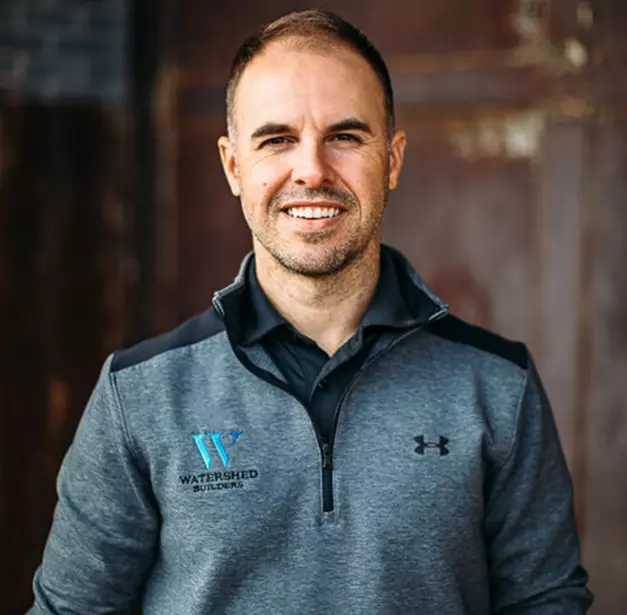
Dominick Thompson
Licensed General Contractor
“Our vision is to honor God by serving with integrity, communicating with excellence, and building with quality craftsmanship.”
A born and raised Charlottean, I am a husband, father, friend, and licensed General Contractor (NC #77743) building and remodeling homes in the Charlotte, North Carolina area.
As an active Reservist in the United States Air Force, I have built construction projects around the globe for the world’s greatest warfighters. As a licensed commercial and residential General Contractor, I’ve completed projects in Myers Park, Eastover, Foxcroft, SouthPark, and Ballantyne – the finest neighborhoods in Charlotte. I love working with clients who appreciate quality in the process, materials, and relationships.
Whether in hostile environments abroad or here at home, the keys to a well-executed project are the same – dedication, hard work, communication, and a passion for excellence. Our team at Watershed Builders looks forward to earning your trust while building or upgrading the place you call home.
